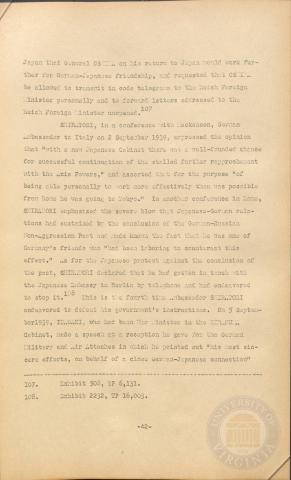
Page 42
| Parent | Japanese - German - Italian Collaboration |
|---|---|
| Date | |
| Language | English |
| Collection | Tavenner Papers & IMTFE Official Records |
| Box | Box 14 |
| Folder | Japan, Germany, Italy Collaboration and Introduction |
| Repository | University of Virginia Law Library |
Japan that General 08,111. A on his return to Japan would work fur¬ther for German-Japanese friendship, and requested that OSHIMA be allowed to transmit in code telegrams to 'the Reich Foreign
Minister personally and to forward letters addressed to the
Reich Foreign Minister unopened. 107
SHIRATORI, in a conference with Mackensen, German Ambassador to Italy on 2 September 1939? expressed the opinion that "with a new Japanese Cabinet there was a well-founded chance for successful continuation of the stalled further rapprochement with the Axis Powers," and asserted that for the purpose "of being able personally to work more effectively than was possible from Rome he was going to Tokyo." In another conference in Rome, SHIRATORI emphasized the severe blow that Japanese-German rela¬tions had sustained by the conc3.usion of the German-Russian Non-Aggression Pact and made known the fact that lie was one of Germany's friends who "had been laboring to counteract this effect." As for the Japanese protest against the conclusion of the pact, SHIRxtoHI declared that he had gotten in touch with
the Japanese Embassy in Berlin by telephone and had endeavored
to stop it. 108 This is the fourth time ambassador SHIRATORI endeavored to defeat his government's instructions. On 5 Septem¬ber 1939, ITAGAGAKIK who had been War Minister in the HXIUNUl^ Cabinet, made a speech at a reception he gave for the German Military and Air Attaches in which he pointed out "his most sin¬cere efforts, on behalf of a close German-Japanese connection"
107.Exhibit 508, TP 6,131.
108.Exhibit 2232, TP 16,003.
